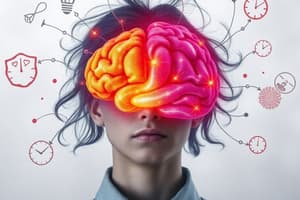Podcast
Questions and Answers
What is the first component of emotional intelligence?
What is the first component of emotional intelligence?
- Self-awareness (correct)
- Social awareness
- Motivation
- Empathy
Which of the following is NOT a key element of emotional intelligence?
Which of the following is NOT a key element of emotional intelligence?
- Motivation
- Empathy
- Self-regulation
- Sympathy (correct)
Which aspect of emotional intelligence involves recognizing and understanding the emotions of others?
Which aspect of emotional intelligence involves recognizing and understanding the emotions of others?
- Motivation
- Social awareness (correct)
- Self-awareness
- Empathy
What does self-awareness in emotional intelligence primarily involve?
What does self-awareness in emotional intelligence primarily involve?
How many key elements make up emotional intelligence according to the text?
How many key elements make up emotional intelligence according to the text?
In emotional learning, what does empathy primarily involve?
In emotional learning, what does empathy primarily involve?
What is empathy?
What is empathy?
Which statement about social awareness is accurate?
Which statement about social awareness is accurate?
Who introduced the concept of emotional intelligence in 1997?
Who introduced the concept of emotional intelligence in 1997?
Why is self-awareness important for individuals?
Why is self-awareness important for individuals?
What is a key benefit of developing empathy according to the text?
What is a key benefit of developing empathy according to the text?
Which statement about emotional competencies is true according to Dan Goleman?
Which statement about emotional competencies is true according to Dan Goleman?
Study Notes
Emotional learning is the process of understanding your emotions and using them to guide your thoughts, actions, and interactions with others. This type of education focuses on developing skills related to emotional intelligence, which includes five key elements: self-awareness, self-regulation, motivation, empathy, and social awareness. These aspects play a crucial role in shaping our personal growth and relationships. Let's delve deeper into each one.
Emotional Intelligence
Emotional intelligence is the ability to recognize and understand emotions in oneself and others, as well as to respond appropriately. It encompasses several components, including:
- Self-awareness: Understanding your own emotions and how they influence behavior.
- Self-management: Regulating emotions and maintaining composure during challenging situations.
- Social awareness: Recognizing and understanding the emotions of others.
- Relationship management: Building strong relationships through effective communication and collaboration.
These components work together to enable individuals to navigate complex interpersonal dynamics and manage conflict effectively.
Self-Awareness
Self-awareness is the first component of emotional intelligence. It involves recognizing your own emotions and how they affect you. By understanding your feelings and their impact on your decisions, you can improve your overall effectiveness. Being self-aware helps you to identify when you need to change your approach and makes it easier to adapt to different working environments.
Empathy
Empathy is the ability to understand and share the feelings of another person. It involves stepping into someone else's shoes and seeing things from their perspective. Developing empathy allows us to build stronger connections with others, fostering more positive interactions. It also enhances our ability to communicate effectively and resolve conflicts constructively.
Social Awareness
Social awareness is the skill of perceiving the emotional states of those around you. It enables you to pick up nonverbal cues, such as body language and tone of voice, which can reveal what people may not be saying explicitly. Developing this skill allows you to interact effectively with your colleagues, customers, and other stakeholders.
Trivia
Here are some interesting facts related to emotional learning:
- Dan Goleman, author of "Emotional Intelligence," estimates that emotional competencies account for almost twice the variance between high performers and average performers than do cognitive abilities alone.
- The concept of emotional intelligence was introduced by psychologists John Mayer and Peter Salovey in 1997. They described emotional intelligence as the ability to recognize, understand, and manage emotions in oneself and others.
- A study found that people who possess high emotional intelligence are more likely to be leaders.
- Emotional intelligence is a critical skill for success in the workplace, as it helps individuals to navigate complex social situations and build stronger relationships.
In conclusion, emotional learning is an essential aspect of personal growth and development. By focusing on emotional intelligence, self-awareness, empathy, and social awareness, individuals can improve their ability to understand and manage their emotions, build strong relationships, and ultimately achieve greater success in their personal and professional lives.
Studying That Suits You
Use AI to generate personalized quizzes and flashcards to suit your learning preferences.
Description
Delve into emotional learning and intelligence by exploring components such as self-awareness, empathy, and social awareness. Learn about the importance of recognizing, understanding, and managing emotions to enhance personal growth and achieve success in relationships and the workplace.




